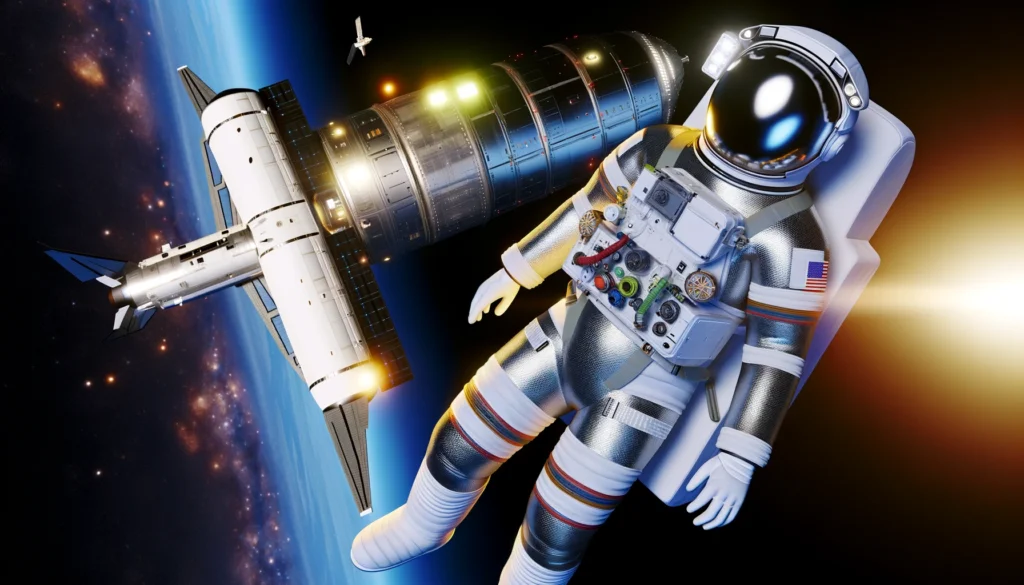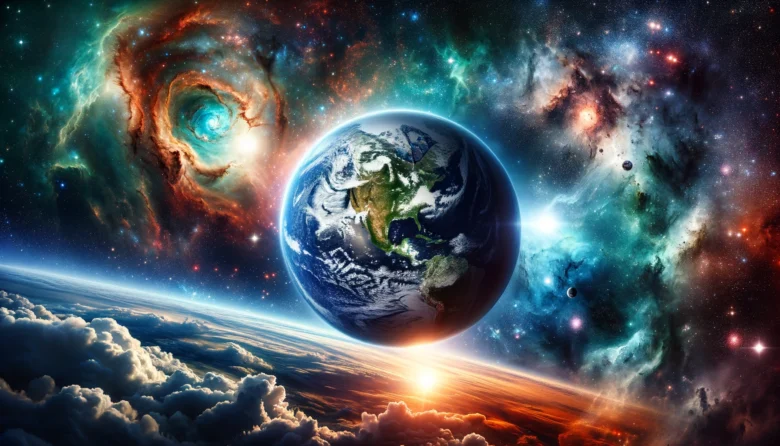Welcome to the second part of our Blog Series – “Space Tourism: Navigating Its Complex Paradoxes”.
Space tourism stands at the intersection of innovation and imagination, promising to turn the dreams of star travel into reality for the average person. Yet, as we edge closer to making these dreams a reality, we encounter a series of paradoxes that challenge our perceptions and aspirations. These contradictions invite us to think deeply about the future we’re building as we step into the cosmos.
The Allure and Limits of Space Exploration
The dream of space exploration has captivated humanity for generations. The sheer thought of venturing beyond Earth’s atmosphere, witnessing the curvature of our planet against the vast, starry expanse, taps into our deepest desires for adventure and discovery. This allure is at the heart of space tourism, offering ordinary people the once-in-a-lifetime opportunity to become astronauts in their own right. Companies like SpaceX (a leader in aerospace manufacturing and space transport), Virgin Galactic (specializing in spaceflight tourism), and Blue Origin (focused on human spaceflight) are at the forefront, turning these dreams into reality.

They promise a future where the cosmos is not just a realm for seasoned astronauts but a destination for anyone with the desire (and the means) to reach for the stars. However, the limitless allure of space exploration comes with its own set of boundaries. Despite the rapid advancements in technology that have made space tourism conceivable, there are still significant barriers to universal access and broader exploration. The cost of space travel remains prohibitively high for most, limiting access to a privileged few.
Moreover, the physical and psychological demands of space travel pose additional hurdles, requiring rigorous training and health screenings that can exclude many interested participants. These constraints remind us that while the dream of space tourism grows closer to reality, it still operates within a framework of technological, financial, and human limitations that must be navigated carefully to truly open the final frontier to all.
Adventure Versus Safety
The essence of adventure in space tourism lies in its promise of the unknown, the thrill of breaking free from Earth’s gravitational pull to explore the vastness of space. This unparalleled adventure offers experiences that are beyond the reach of any Earth-bound journey, such as witnessing the ethereal beauty of Earth from a space capsule or experiencing weightlessness.

These moments encapsulate the true spirit of exploration and the enduring human quest to conquer new frontiers. As companies pave the way for these cosmic adventures, they ignite the imaginations of people around the world, making the once-impossible dream of space travel a tangible reality for the adventurers among us.
However, the pursuit of adventure in space does not come without its challenges, paramount among them being the imperative of safety. Space travel, by its very nature, involves navigating an environment that is inherently hostile to human life, requiring meticulous planning, state-of-the-art technology, and rigorous safety protocols to ensure the well-being of space tourists. The tragic accidents in the history of space exploration serve as somber reminders of the risks involved.
As a result, space tourism companies invest heavily in safety measures, from the design of spacecraft to the training of passengers, to mitigate these risks. This focus on safety often means tempering the adventurous spirit with caution, balancing the desire for the extraordinary with the unyielding demands of ensuring a safe return to Earth. In this way, the adventure of space tourism is shaped not just by the boundless possibilities of space but by the practical necessities of navigating its dangers.
The Sublime Versus the Routine
The concept of the sublime in space tourism is deeply intertwined with the awe-inspiring experience of viewing Earth from the vast emptiness of space. This profound encounter offers a perspective that few have experienced, evoking a sense of wonder, humility, and a renewed appreciation for the fragility of our planet. It’s an emotional and philosophical journey that transcends the physical, touching the very essence of our existence.

We are promised not just a trip beyond the atmosphere but an opportunity to experience the sublime — to feel a connection with the cosmos that is both exhilarating and transformative. This unique aspect of space travel has the power to shift worldviews, fostering a sense of global unity and a collective responsibility toward Earth’s stewardship.
Yet, as space tourism aims to become more accessible and frequent, there’s a looming possibility that the extraordinary could become ordinary. The transition from a once-in-a-lifetime expedition to a more routine activity carries the risk of diminishing the sublime nature of space travel. If trips to space become as common as flights to another continent, the question arises: will the awe fade into the background, transforming a profound experience into just another travel option?
This challenge confronts the space tourism industry with a paradox — how to maintain the profound impact of the sublime experience amid the normalization of space travel. Balancing the expansion of access with the preservation of wonder is crucial for ensuring that the essence of space exploration remains a transformative journey, rather than just another entry in the travel itinerary.
Environmental Impact Versus Exploration
The juxtaposition of environmental impact versus exploration in the realm of space tourism encapsulates a significant ethical and practical debate. On one hand, the drive to explore space taps into humanity’s innate curiosity and desire for discovery, pushing the boundaries of what’s possible and expanding our understanding of the universe. This quest for exploration represents a leap forward in human achievement and scientific knowledge. It’s an endeavor that promises not only new horizons in space but also potential benefits for Earth, from advances in technology and science to the inspirational effect on future generations.

On the other hand, the environmental footprint of launching spacecraft into orbit cannot be ignored. The combustion of rocket fuel releases significant amounts of greenhouse gases and other pollutants into the Earth’s atmosphere, contributing to climate change and potential harm to the ozone layer. Additionally, the increasing number of satellites and potential space debris from tourism activities pose risks to both the environment and existing satellite infrastructure.
This raises a critical question: How can we reconcile the desire to explore and utilize space with the responsibility to preserve our planet’s ecological balance? Finding a sustainable path forward requires innovative solutions, such as developing cleaner rocket technologies or more efficient fuel alternatives, and implementing international regulations to minimize space debris. As space tourism continues to evolve, balancing these dual objectives of exploration and environmental stewardship will be paramount to ensuring that our extraterrestrial ambitions do not compromise the well-being of our home planet.
What to Expect Next?
As we continue our exploration of space tourism, our next post will delve into the economic implications and market dynamics of this emerging industry. How does the development of space tourism affect the global economy, and what opportunities does it create for future innovation and growth? Stay tuned as we examine the financial landscape of venturing beyond Earth.
Author’s Note
In this third part of the series, we aim to peel back the layers of excitement surrounding space tourism to reveal the complex challenges and opportunities it presents. By exploring the paradoxes of space tourism, we hope to spark a thoughtful dialogue about how we can navigate these contradictions to create a future where space exploration enriches humanity without compromising our ethical and environmental values.
G.C., Ecosociosphere contributor.
References and Further Reading:





Comments
I don’t think the title of your article matches the content lol. Just kidding, mainly because I had some doubts after reading the article.
Thanks for sharing. I read many of your blog posts, cool, your blog is very good.
Thanks for sharing. I read many of your blog posts, cool, your blog is very good.
Thanks for sharing. I read many of your blog posts, cool, your blog is very good.
Your article helped me a lot, is there any more related content? Thanks!
I don’t think the title of your article matches the content lol. Just kidding, mainly because I had some doubts after reading the article.
Can you be more specific about the content of your article? After reading it, I still have some doubts. Hope you can help me.
I don’t think the title of your article matches the content lol. Just kidding, mainly because I had some doubts after reading the article.
Have you ever considered publishing an ebook or guest authoring on other blogs?
I have a blog centered on the same subjects you discuss and
would love to have you share some stories/information. I
know my audience would value your work. If you are even remotely interested, feel
free to shoot me an email.
Thanks for sharing. I read many of your blog posts, cool, your blog is very good.
I am sure this article has touched all the internet users, its really really pleasant paragraph on building up new website.
Ahaa, its good discussion on the topic of this post here at this weblog, I have read all that, so now me also commenting here.
Greetings! Very helpful advice in this particular post! It is the little changes that produce the largest changes. Many thanks for sharing!
Neat blog! Is your theme custom made or did you download it from somewhere? A theme like yours with a few simple tweeks would really make my blog jump out. Please let me know where you got your theme. Thanks
I am really impressed with your writing skills as well as with the layout on your blog. Is this a paid theme or did you customize it yourself? Either way keep up the excellent quality writing, it is rare to see a nice blog like this one nowadays.
A placar de futebol ao vivo oferece uma plataforma segura para saques rápidos, sem complicação.
Basta enviar seus documentos corretamente.
A person essentially lend a hand to make seriously posts I would state.
That is the first time I frequented your website
page and to this point? I surprised with the research you made
to make this particular publish incredible. Excellent task!
Thanks designed for sharing such a nice thought, article is nice, thats why i have read it fully